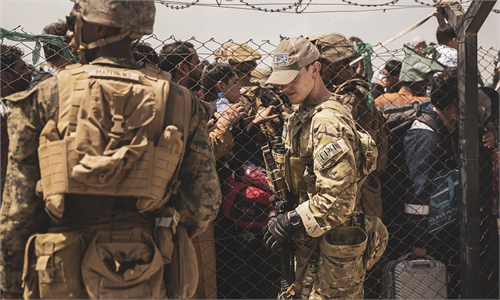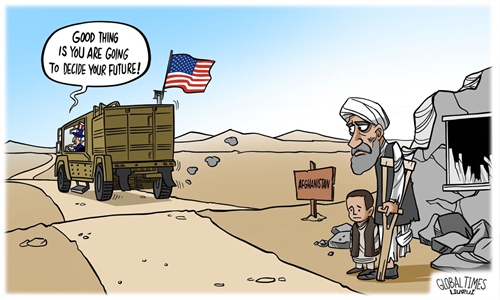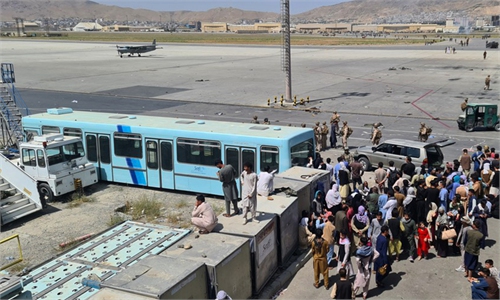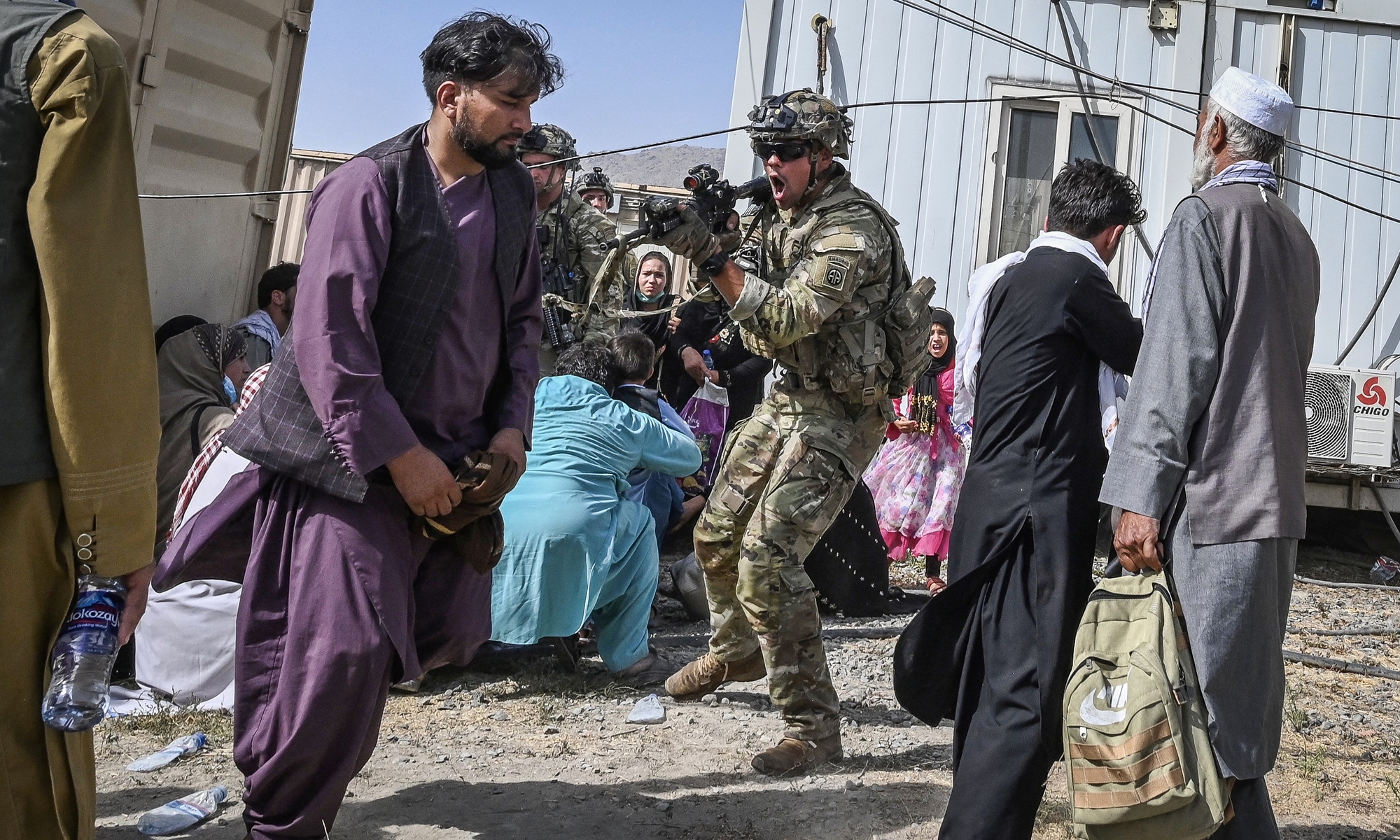
A US soldier (center) points his gun at an Afghan passenger at Kabul airport on Monday as thousands of people mobbed the city's airport trying to flee the country. Photo: AFP
The Afghan Taliban' takeover of Kabul on August 15 once again proved that the US interventionist policy based on hegemony had failed. However, the price of this failure is too high for both the Afghan people and the international community. Washington has suffered the bad consequences of its own actions as the invader. And countries like the US are to blame for the long-standing human rights abuses against the Afghan people.The US policy of interventionism has created a human rights crisis.
The US didn't bring peace, stability and development to Afghanistan. In sharp contrast, after two decades of occupation by and control under the US and its allies, Afghanistan is still in a state of war, rampant violence, and terrorism. Afghan society is devastated. People are suffering everywhere in the country.
The US intervention has not only posed a serious threat to the peace and stability of the entire region, but also jeopardized the Afghan people's right to survive and live. Since entering Afghanistan in October 2001, US forces have killed more than 30,000 civilians, and injured more than 60,000. They have also made around 11 million people - nearly one-third of the country's population - refugees. US troops in Afghanistan have repeatedly attacked civilians and caused heavy casualties and resulted in the destruction of property. Their war crimes have even triggered an investigation by the International Criminal Court in 2017.
In addition, two decades of war and turmoil have seriously destroyed the chances of the healthy development of Afghan society. For example, all infrastructure in Afghanistan is extremely underdeveloped or in a dreadful state of dilapidation. The country's economic development is highly dependent on international aid and funding. What is worse is that Afghanistan has become the world's largest opium producer. This has made the Afghan economy fall into a crooked and unsustainable model.
Moreover, under the banner of counter-terrorism and humanitarianism, the US intervention has failed to eliminate the foundations of terrorism. Instead, it has destroyed the original social structure in Afghanistan. Because of that, Afghanistan has lost control over extremist and terrorist forces, giving them an opportunity to grow. As a result, the number of terrorist groups in Afghanistan has increased dramatically and spread to the Middle East and East Asia.
The human rights crisis in Afghanistan reflects the US' Cold War mentality.
The struggle of the US in Afghanistan is one of the latest evil consequences of its hegemonic expansion. Behind the tragic fate of the Afghan people, we can see Washington's reckless and overbearing behaviors in international politics, as well as its Cold War mentality. This includes sticking to the zero-sum game and refusing to cooperate and accommodate the multilateral international order.
Such a foreign policy combined self-righteous American exceptionalism, a smug missionary spirit and extremely self-serving demands of capitalist expansion. With US' victory in World War II, such policy has evolved into symbol of US-style hegemony, creating decades of Cold War confrontations and international frictions.
The US is good at portraying its interventions, invasions, and manipulations of other countries as moves to pursue "the interest for the majority" and to seek "universal values." In terms of national interests, the US labels such interventionism as a necessary factor to protect the interests of itself and its allies. It also claims to do this in order to maintain regional security and stability. When it comes to ideology, the US has repeatedly strengthened its status as a spokesperson of "universal values" in the international community. With this, it is trying to influence the attitude of the international public opinion on its interventional moves.
Since the Vietnam War (1955-75), almost all the US' interventional activities throughout the Cold War developed along this path. When meddling with internal affairs of Vietnam, Angola, and Nicaragua, the US government said it was doing this to safeguard the "free world." It labeled itself as a vital force against the Soviet Union. When invading Panama on the pretext of "to ensure democratic elections," the US actually aimed at seizing control over the Panama Canal. Washington's intervention in Lebanon and Libya was also unabashedly linked to their oil resources. After the Cold War, in the name of humanitarian intervention and counter-terrorism, the US' meddling with Kosovo, Afghanistan, Iraq, and some North African countries was to tie international collective security mechanism to its own interventionist policy.
The US' failure of interventionism in Afghanistan is not its first defeat, nor will it be the last one. Even today, the specter of interventionism in the name of human rights still haunts the world. In the regard of Hong Kong, the island of Taiwan, as well as China's Xinjiang Uygur Autonomous Region, the US has framed up various human rights accusations against China. In Latin America, the US is still stubbornly ramping up its efforts to reinforce "the fence of its backyard." In the Arab world, the trauma and turmoil resulted from the "color revolutions" continues tothis day. Washington's intervention in the internal affairs of other countries embodies its ambition and hypocrisy of hegemonic expansion, and has led to human rights crises one after another in the international community.
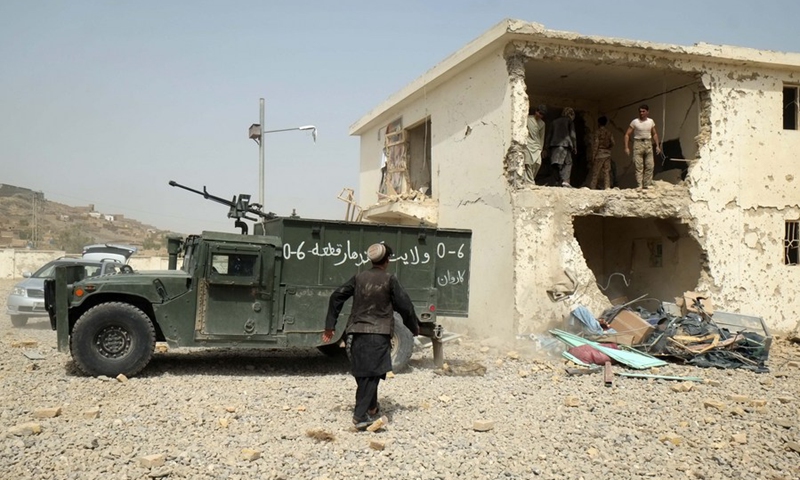
Afghan security forces inspect the site of a car bombing in Kandahar city, capital of Kandahar province, southern Afghanistan, on July 6, 2021.(Photo: Xinhua)
The future of human rights needs multilateral cooperation.The US' plight in Afghanistan resulted from its hegemony and interventionist policy. It clearly indicates to politicians in Washington that the gunboat diplomacy and Cold War mentality have become remains of the past. In today's international community, the situation in which a country is capable and qualified to determine the fate and future of the people living in some other countries is declining.
The interventionism of some Western countries has triggered turmoil and conflicts. Countries represented by China which adhere to the noninterference, have always advocated addressing problems by proactive and effective political mediation, economic assistance, social construction and communications. They are attempting to constantly promote regional peace and stability, lend a helping hand to the countries that suffered hardships, and make outstanding contributions to the progress of international human rights course.
In Africa, countries like Rwanda have emerged from the shadows of the massacre and civil strife to become dynamic economies on a trajectory of growth. In South America, Chinese vaccines are playing an important role in helping Chile, Brazil and some other regional countries to get rid of the "vaccine nationalism" monopoly of Western countries, and to protect people's life and health. In the Central Asia, China has proactively provided institutional guarantees for combating terrorism and curbing extremism.
Interventionism is coming to an end together with imperial hegemony. Afghanistan, as well as other ethnic groups and lands, has suffered from the political interference of the great powers. But now they will have the opportunity to strive for their own happiness with the people of the world under the multilateral order of equality, mutual benefit and friendship.
He Zhipeng is standing council member of the China Society for Human Rights Studies at Jilin University. Zhao Jianzhou is a PhD candidate of the China Society for Human Rights Studies at Jilin University. opinion@globaltimes.com.cn
